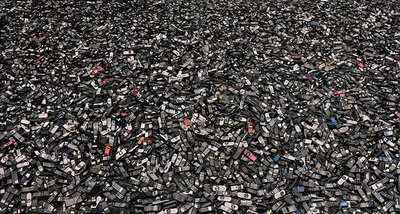In an article entitled You and the Atom Bomb, George Orwell wrote about the relationship between military technology and democratic development. National self-determination is, according to Orwell’s technologically deterministic argument, a product of the ability to develop efficient arms.
The great age of democracy and of national self-determination was the age of the musket and the rifle…Even the most backward nation could always get hold of rifles from one source or another, so that Boers, Bulgars, Abyssinians, Moroccansâ??even Tibetansâ??could put up a fight for their independence, sometimes with success. But thereafter every development in military technique has favoured the State as against the individual, and the industrialised country as against the backward one. There are fewer and fewer foci of power. Already, in 1939, there were only five states capable of waging war on the grand scale, and now there are only threeâ??ultimately, perhaps, only two. This trend has been obvious for years, and was pointed out by a few observers even before 1914. The one thing that might reverse it is the discovery of a weaponâ??or, to put it more broadly, of a method of fightingâ??not dependent on huge concentrations of industrial plant. (full article here)
The concept of war and peace has changed since Orwell published this article in Tribune (19 October 1945). Those old enough to have experienced the world wars (either as participants or spectators) claim that we have had peace. This is strange to as I cannot remember a single period in my life when we were not at war with some nation (echoes of Orwell’s 1984?)
This peace is therefore an illusion, a consensual hallucination, if the interpretation of reality claims that we are at war then we are at war. If the claim is that we are at peace then we are at peace. Naturally this does not effect the fact that people are being killed, or that military forces are attacking each other. It just does not mean that we are not living in peacetime.
The atom bomb nicknamed Fat Man was dropped on Nagasaki exploded at 11:02 A.M on August 9.
It left an estimated 70,000 dead by the end of 1945.
While living in this myth of peace the threat of all out war remains a threat but in reality war remains based in the use of the rifle or rifle-like weaponry. Since there is no real war in (or with) Afganistan, Iraq, India/Pakistan (Kashmir) or Indonesia (For lists of ongoing conflicts look here and here) but only ‘conflicts’ the struggle remains focused around the rifle.
This is not, as Orwell thought, the technical ability to mass-produce this relatively simple technology but rather the ability to obtain cash or credits to be able to buy small arms (estimated black market trade in small arms range from US$2-10 billion a year). In conflicts such as these it is not the posession of advanced technology that resolves the conflict but rather the money and determination to accept heavy losses.







